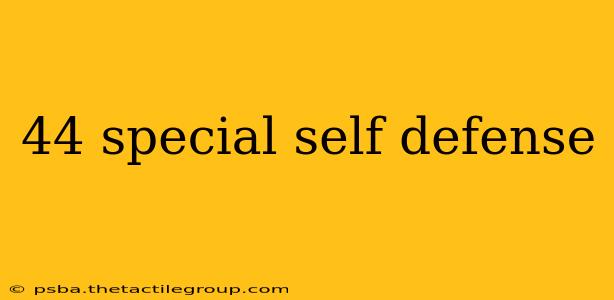The .44 Special cartridge, while not the most common self-defense round, holds a unique place in the world of personal protection. Its history, power, and availability make it a compelling choice for some, while its drawbacks dissuade others. This comprehensive guide will explore the .44 Special's strengths and weaknesses for self-defense, helping you decide if it's the right caliber for you.
Understanding the .44 Special
The .44 Special, developed in 1908, predates many modern self-defense calibers. It's a relatively large cartridge with a significant stopping power, stemming from its heavier bullets and substantial energy transfer. This makes it effective against larger threats.
Advantages of .44 Special for Self-Defense:
- Stopping Power: The .44 Special's heavier bullets deliver significant energy upon impact, increasing the likelihood of incapacitating an attacker. This is its primary advantage.
- Availability: While not as ubiquitous as 9mm or .45 ACP, .44 Special ammunition is readily available from most reputable firearms retailers.
- Recoil Management (Relatively): Compared to some more powerful magnum rounds, the .44 Special's recoil, while substantial, is manageable for many shooters with proper training and technique. This is crucial for reliable follow-up shots.
- Variety of Loads: You can find a range of .44 Special loads, from less powerful options for practice to heavier, more potent rounds for self-defense.
Disadvantages of .44 Special for Self-Defense:
- Recoil: While manageable for many, the recoil is still significant, potentially affecting accuracy, especially for less experienced shooters.
- Capacity: Many revolvers chambered in .44 Special have limited capacity, typically 5 or 6 rounds. This means fewer shots available in a self-defense situation.
- Size and Weight: .44 Special revolvers tend to be larger and heavier than firearms chambered in smaller calibers. This can impact concealability.
- Overpenetration: The .44 Special's power can lead to overpenetration, posing a risk to bystanders or unintended targets beyond the immediate threat.
Choosing a .44 Special Self-Defense Handgun
If you're considering the .44 Special for self-defense, careful handgun selection is paramount. Look for revolvers known for reliability, accuracy, and ease of use. Consider factors like:
- Action Type: Double-action revolvers allow for faster firing without manual cocking, while single-action revolvers offer a smoother trigger pull but require manual cocking.
- Sight System: Good sights are crucial for accurate shooting. Consider adjustable sights for fine-tuning your aim.
- Grip: A comfortable and secure grip is essential for controlling recoil.
Ammunition Considerations
Ammunition selection plays a vital role in self-defense. For the .44 Special, consider:
- JHP (Jacketed Hollow Point): JHP rounds are designed to expand on impact, maximizing stopping power while minimizing overpenetration. They are the preferred choice for self-defense.
- Full Metal Jacket (FMJ): FMJ rounds are less likely to expand, leading to potentially more overpenetration. They're generally suitable for practice but not ideal for self-defense.
Training and Practice
Regardless of the caliber chosen, rigorous training is essential for effective self-defense. Practice regularly with your .44 Special revolver, focusing on:
- Safe Handling: Learn and consistently practice safe firearm handling techniques.
- Accuracy: Develop the skills necessary for accurate shooting under pressure.
- Recoil Management: Master recoil control to ensure accurate follow-up shots.
- Situational Awareness: Develop skills to anticipate and avoid dangerous situations.
Conclusion
The .44 Special, with its significant stopping power, can be an effective self-defense cartridge. However, its drawbacks, particularly recoil and limited capacity, need careful consideration. Thorough research, responsible firearm ownership, and extensive training are crucial before choosing this powerful caliber for self-defense. Remember to always consult with local laws and regulations regarding firearm ownership and self-defense. This information is for educational purposes only and should not be considered legal or professional advice. Always seek professional guidance regarding firearm safety and self-defense strategies.

